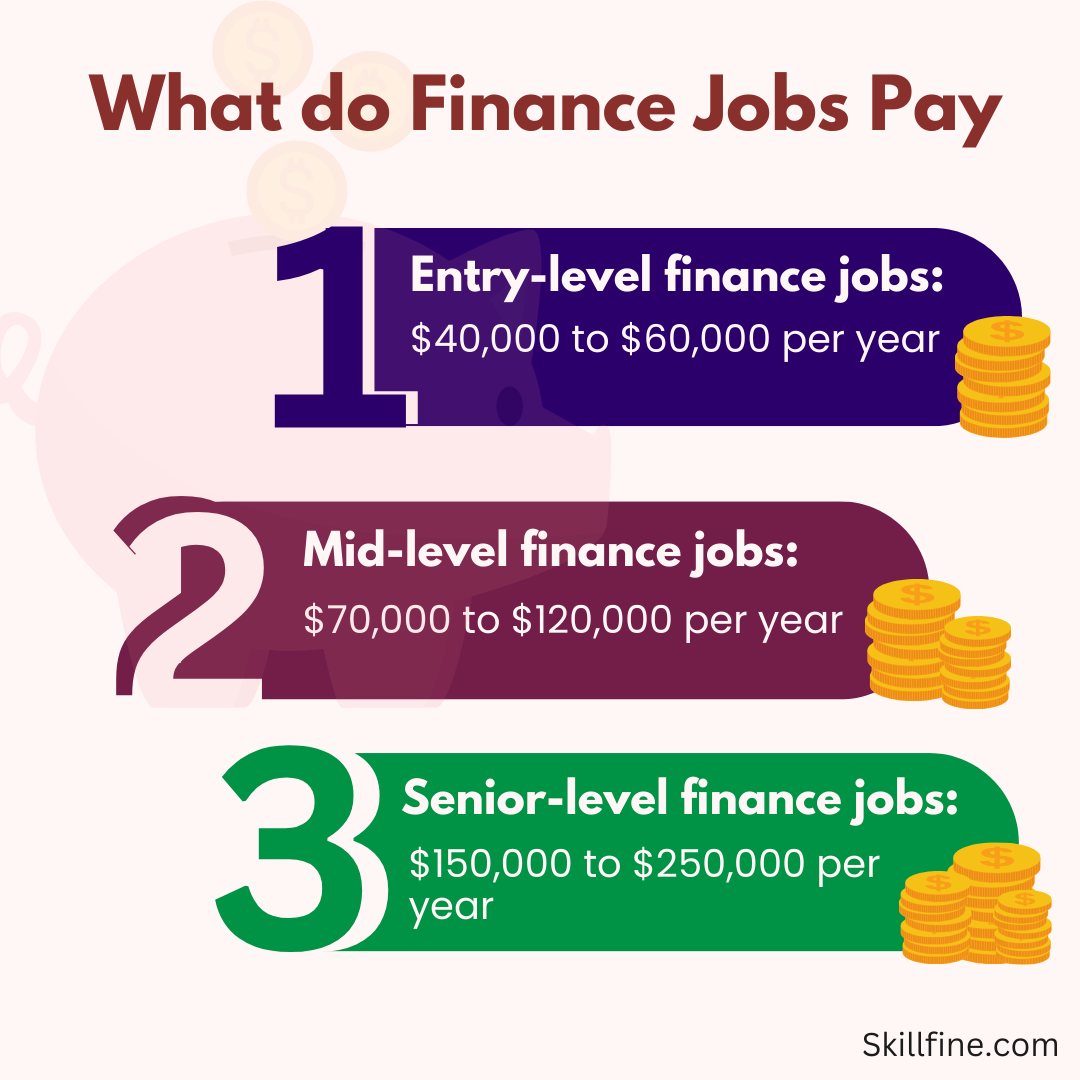Are you considering a career in finance, but unsure about the salary range? Or are you currently in an entry-level finance job and wondering how much you can expect to earn as you progress in your career? Understanding the range of finance job salaries can help you make informed decisions about your career path and negotiate better compensation. From entry-level positions like financial analysts to executive roles like chief financial officers, the finance industry offers a wide range of job titles and corresponding salaries.

In this article, we’ll explore the different factors that determine finance job salaries, the typical salary ranges for various finance jobs, and how to advance in your finance career to earn a higher salary. So, whether you’re just starting out or looking to advance in your finance career, read on to learn more about finance job salaries.
Overview of the Finance Industry
The finance industry is a broad field that encompasses a wide range of job titles and roles. Some of the most common finance jobs include financial analysts, accountants, investment bankers, financial advisors, and chief financial officers (CFOs). Finance professionals work in various settings, such as banks, investment firms, corporations, and government agencies.
One of the key factors that determine finance job salaries is the industry in which the professional works. For example, finance professionals who work for investment banks or hedge funds often earn higher salaries than those who work for non-profit organizations or government agencies. Additionally, the level of education and experience also plays a significant role in determining finance job salaries.
Entry Level Finance Job Salaries
Entry-level finance jobs are typically held by recent graduates or individuals with limited experience in the field. These positions often require a bachelor’s degree in finance, accounting, or a related field. Some of the most common entry-level finance jobs include financial analysts, accounting assistants, and investment banking analysts.
The typical salary range for entry-level finance jobs varies depending on the industry and location. In general, entry-level finance positions pay between $40,000 and $60,000 per year. Financial analysts, for example, can expect to earn an average salary of $59,000 per year, while accounting assistants earn an average salary of $40,000 per year.
Mid-Level Finance Job Salaries
Mid-level finance jobs are held by professionals with several years of experience in the field. These positions often require a master’s degree in finance, accounting, or a related field, as well as professional certifications such as a Certified Public Accountant (CPA) or Chartered Financial Analyst (CFA). Some of the most common mid-level finance jobs include financial managers, investment bankers, and senior accountants.
The typical salary range for mid-level finance jobs varies depending on the industry and location. In general, mid-level finance positions pay between $70,000 and $120,000 per year. Financial managers, for example, can expect to earn an average salary of $96,000 per year, while investment bankers earn an average salary of $118,000 per year.
Executive Finance Job Salaries
Executive finance jobs are held by professionals with extensive experience in the field and often require a high level of education and professional certifications. Some of the most common executive finance jobs include chief financial officers (CFOs), chief investment officers (CIOs), and senior financial analysts.
The typical salary range for executive finance jobs varies depending on the industry and location. In general, executive finance positions pay between $150,000 and $500,000 per year. CFOs, for example, can expect to earn an average salary of $316,000 per year, while CIOs earn an average salary of $410,000 per year.
Factors That Affect Finance Job Salaries
Several factors can affect finance job salaries, including education, experience, industry, location, and professional certifications. Individuals with higher levels of education and professional certifications often earn higher salaries than those with only a bachelor’s degree. Additionally, finance professionals who work in high-demand industries such as investment banking often earn higher salaries than those who work in non-profit organizations or government agencies.
Location is another important factor that affects finance job salaries. Finance professionals who work in major cities such as New York, San Francisco, or London often earn higher salaries than those who work in smaller cities or rural areas. Additionally, experience plays a significant role in determining finance job salaries. Professionals with several years of experience in the field often earn higher salaries than those who are just starting out in their careers.
Tips for Negotiating Your Finance Job Salary
Negotiating your finance job salary can be a daunting task, but it’s important to advocate for yourself and ensure that you’re being fairly compensated for your work. Here are a few tips for negotiating your finance job salary:
- Research industry salary trends to ensure that you’re asking for a fair salary based on your experience and education level.
- Highlight your achievements and accomplishments in your current or previous roles to demonstrate your value to the company.
- Be confident and assertive in your negotiations, but also be willing to compromise and find a mutually beneficial solution.
- Consider negotiating other aspects of your compensation package, such as bonuses, stock options, or additional vacation days.
Top-Paying Finance Jobs
While finance job salaries can vary widely depending on the industry and location, some positions consistently rank among the high paying jobs in finance. Here are a few of the top-paying finance jobs:
- Chief Financial Officer (CFO)
- Investment Banker
- Private Equity Manager
- Hedge Fund Manager
- Venture Capitalist
These positions often require extensive experience and education, as well as professional certifications such as a CPA or CFA. However, they also offer the potential for high salaries and significant career advancement.
Future Outlook for Finance Job Salaries
The future outlook for finance job salaries is generally positive, with many positions expected to see steady growth in demand and compensation. However, the finance industry is also subject to economic fluctuations and changes in the global market, which can affect job availability and salaries.
Additionally, the rise of technology and automation is expected to have an impact on the finance industry, with some positions potentially becoming obsolete or requiring new skills and training. Professionals who stay up-to-date with the latest trends and technologies in the industry will be better positioned to take advantage of new opportunities and earn higher salaries.
Conclusion
Understanding the range of finance job salaries is an important part of planning your finance career and negotiating fair compensation for your work. From entry-level positions like financial analysts to executive roles like CFOs, finance professionals work in a wide range of industries and locations, each with its own salary range and career path. By considering factors like education, experience, and industry trends, you can make informed decisions about your finance career and work towards earning a higher salary and advancing in your field.
Some of the frequently asked questions include:
- How much can you expect to earn in an entry-level finance job?
- What factors can affect the salary range for finance professionals?
- Is there a significant difference in pay between entry-level and executive finance positions?
- How does the average salary for finance jobs compare to salaries in other industries?
- Are there any specific skills or qualifications that can lead to higher paying finance jobs?
- How much can entry-level finance professionals expect to earn?
- What is the earning potential for finance professionals as they progress in their careers?
- Are there significant salary differences between different finance job titles?
- What factors contribute to the varying pay scales within the finance industry?
- How does a finance job salary compare to other industries with similar education and experience requirements?


2 thoughts on “From Entry-Level to Executive: Understanding what do Finance Jobs Pay”
[…] is important to note that to know what do finance jobs pay, first, you must know the factors that determine the salary potential. Salary potential can vary […]
clomid online purchase clomid generic clomid for sale